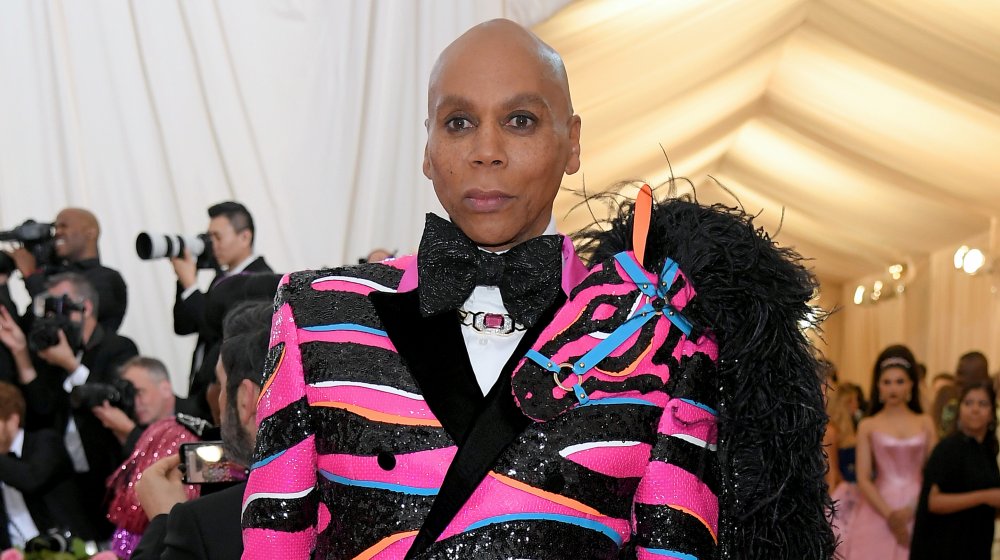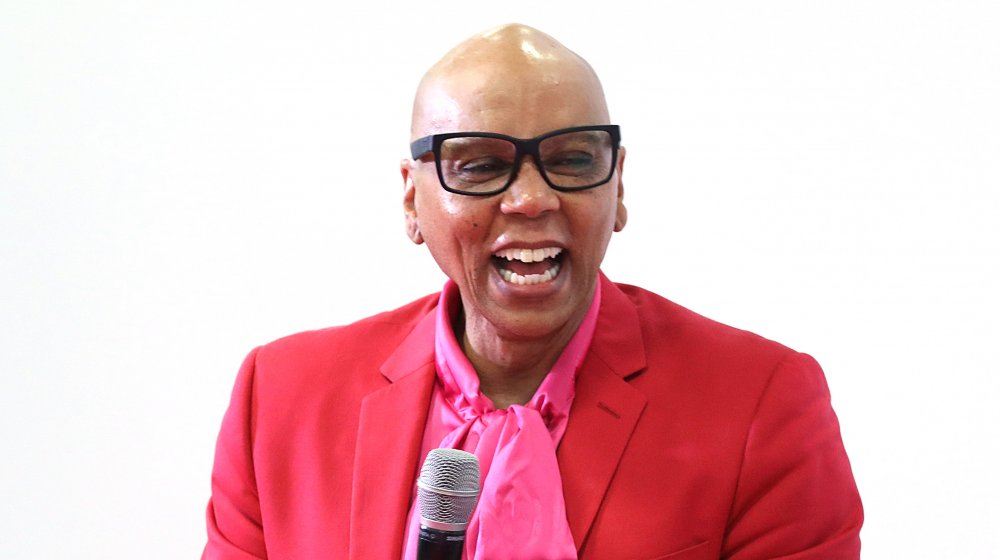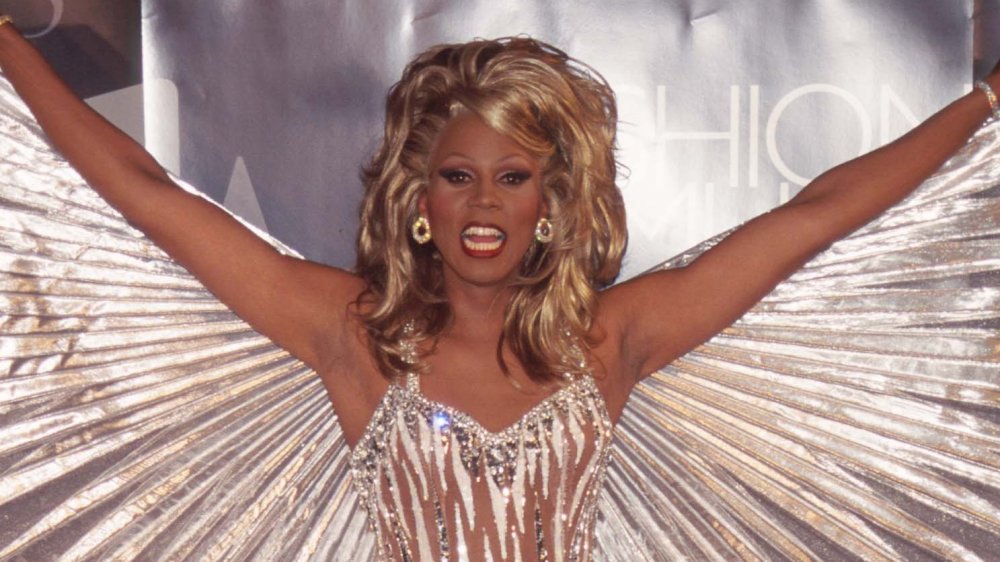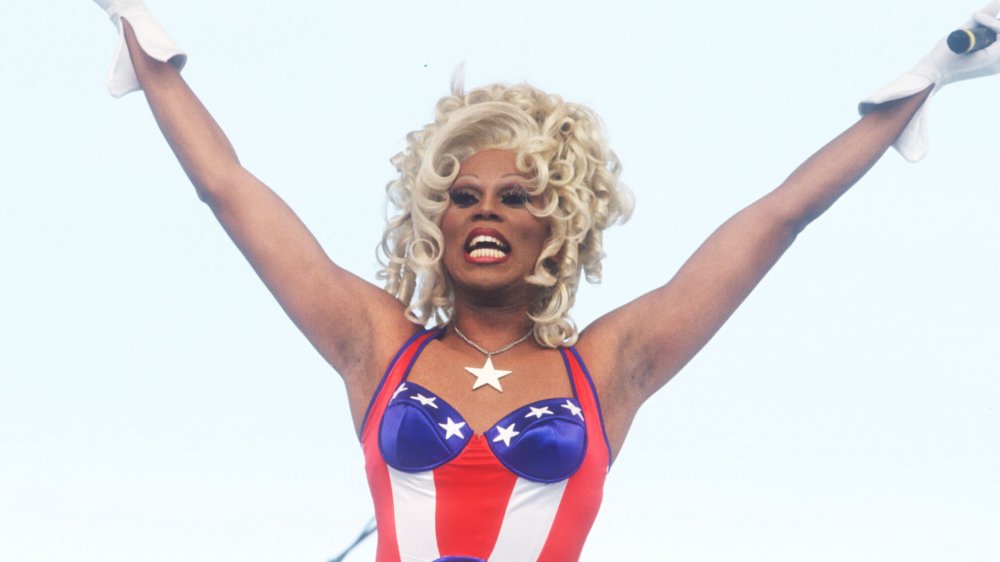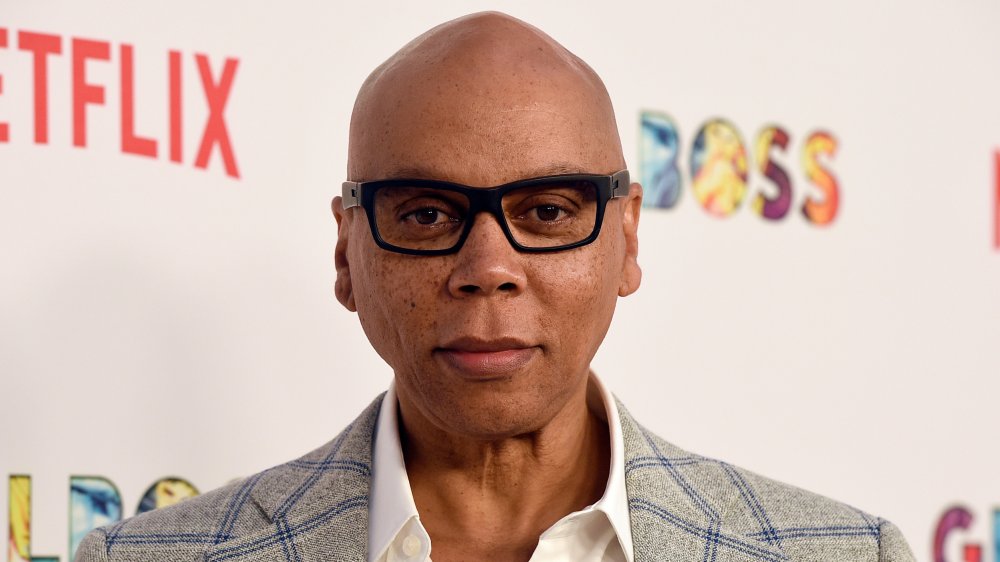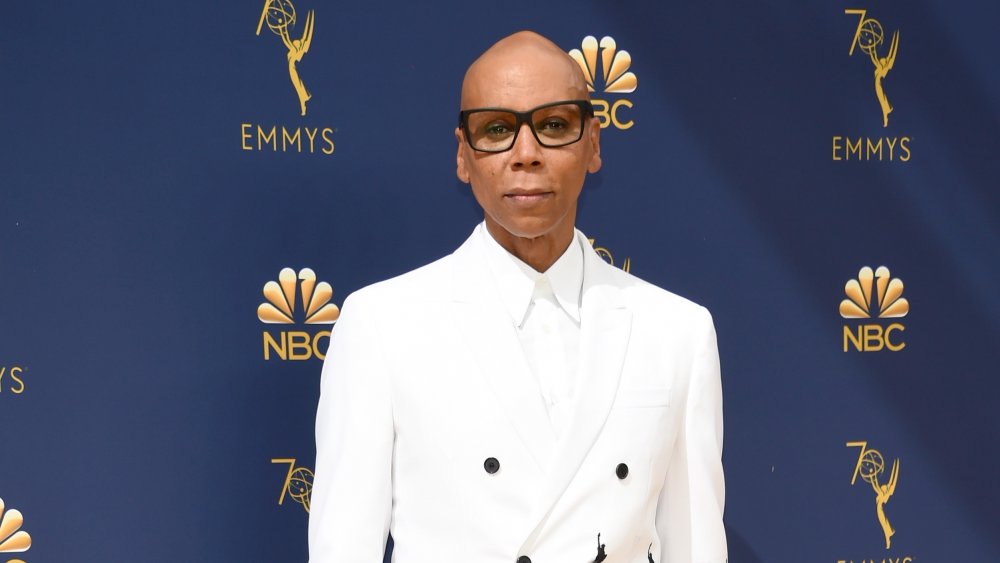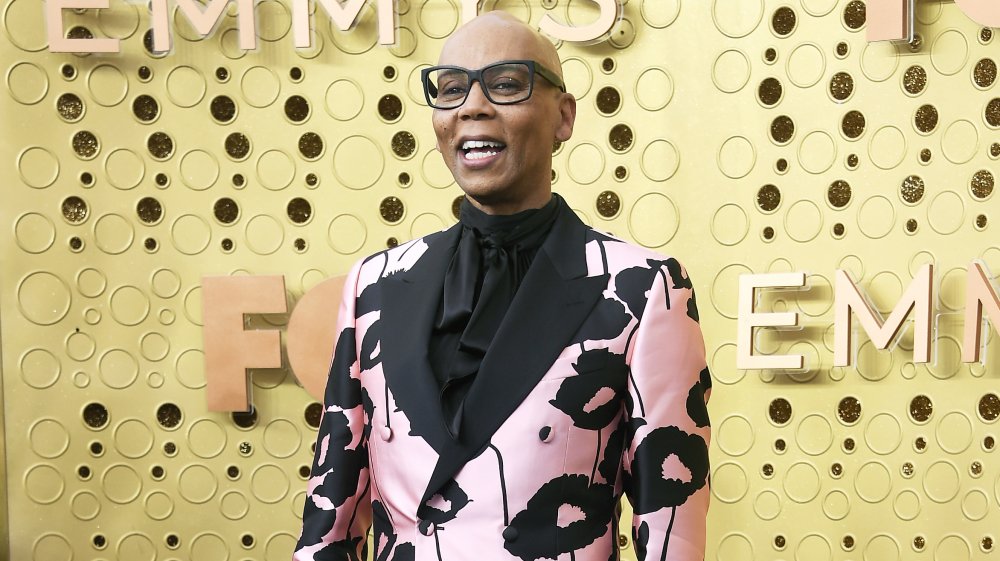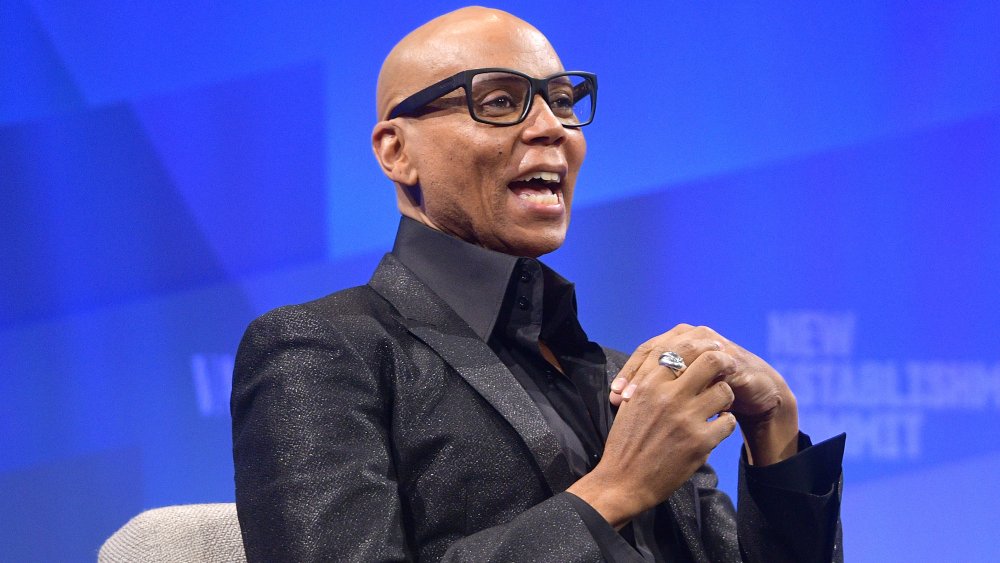The Shady Side Of RuPaul
An absolute legend in the industry, RuPaul has done more for drag culture than perhaps any other person, alive or dead. With the success of her 1993 hit single, "Supermodel (You Better Work)," the drag queen became a superstar. Years later, the multi-talented celeb became the host of the international phenomenon and Emmy award-winning show, RuPaul's Drag Race. RuPaul has now influenced our language and internet behavior. She has also been credited as helping bring LGBTQ+ subcultures to the mainstream audiences.
There is no doubting the positive contributions that RuPaul has made. Many years from now, we will continue to dissect her powerful legacy. Yet, few celebrities enjoy such longevity without taking a few hits here and there, and RuPaul is no exception. Throughout the queen's nearly 30-year career, she has been embroiled in both controversy and scandal. She and her show have been accused of prejudiced behavior and supporting the wrong sides. Here is a glimpse at the shady side of RuPaul.
There have been controversies on RuPaul's Drag Race
Spanning 12 seasons and multiple spin-offs, RuPaul's Drag Race has been a cultural touchstone for TV audiences. In that time, however, the show has been host to quite a few controversies which have threatened to reduce or tarnish its legacy. In season four, for example, Willam was disqualified from the show for having conjugal visits with her husband. Yet, when she responded to a tweet from Leslie Jones, she revealed some unsavory production details and some spicy behind-the-scenes information about RuPaul. Specifically, the contestants were told not to "make eye contact or engage in conversation" with the host.
In season four of Drag Race All Stars, RuPaul allegedly told contestant Manila Luzon to wear a backup dress because her first choice was "in bad taste." That dress, which featured what appeared to be a menstrual pad marked with blood, was designed to "normalize menstruation," as per Luzon. The decision was not taken lightly, and many criticized RuPaul for her part in the decision. The most controversial of all moments took place in season 12 of Drag Race. Sherry Pie or Joey Gugliemelli, one of the frontrunners to take the crown, was disqualified for disturbing catfishing allegations BuzzFeed News published about him. While no condemnation on RuPaul, this left a bit of a black eye on the show.
A community problem
You might think that she has received sainthood in the LGBTQ+ community, but RuPaul has been at odds with that branch at times. In 2018, she backed Lance Bass' use of the word "Tranny," insisting that she loved the word. Later, she doubled down. "I've been a tranny for 32 years," she tweeted (via The Advocate). "The word 'tranny' has never just meant transsexual."
In 2018, RuPaul was asked about how various genders and identities fit in RuPaul's Drag Race, and if it should just be for men. "Drag loses its sense of danger and its sense of irony once it's not men doing it, because at its core it's a social statement and a big f-you to male-dominated culture," she said to The Guardian. "So for men to do it, it's really punk rock, because it's a real rejection of masculinity."
Does that leave space for transgender women, like former contestant Peppermint, who came out on the show? "You can identify as a woman and say you're transitioning, but it changes once you start changing your body," RuPaul said. "It takes on a different thing; it changes the whole concept of what we're doing. We've had some girls who've had some injections in the face and maybe a little bit in the butt here and there, but they haven't transitioned." After some backlash, the host walked her comments back, tweeting, "The trans community are heroes of our shared LGBTQ movement. You are my teachers" (via Billboard).
The bad language criticism
In 2014, a Slate piece drew attention to the use of the term "She-Male" on RuPaul's Drag Race. In the episode in question, the queens were asked to play "Female or Shemale," a game in which they identify whether a close-up image "was a 'biological woman' (female) or a 'psychological woman (shemale)." This was in addition to the already rampant use of the pun "she-mail" on the show in place of mail.
In response, Logo TV made a change to the program. "We wanted to thank the community for sharing their concerns around a recent segment and the use of the term 'she-mail' on Drag Race," they wrote in a statement through HuffPost. "Logo has pulled the episode from all of our platforms and that challenge will not appear again. Furthermore, we are removing the 'You've got she-mail' intro from new episodes of the series. We did not intend to cause any offense, but in retrospect we realize that it was insensitive. We sincerely apologize."
As for RuPaul, she seemed rather annoyed by the switch. "I don't know. You know, I didn't do that," she said in a Vulture interview. "The network did that, and you'd have to ask them why they did it, but I had nothing to do with that."
What the frack?
When RuPaul spoke with Terry Gross on NPR's Fresh Air in early 2020, she was asked about her 60-acre ranch. "No, no, no. Sixty thousand acres," she corrected. She then explained that her lifestyle is much different from what most people picture. "Well, a modern ranch, 21st century ranch, is really land management," she said. "It is — you lease the mineral rights to oil companies. And you sell water to oil companies. And then you lease the grazing rights to different ranchers. So it's land management."
Almost immediately, people jumped to the conclusions that RuPaul was fracking on their land, a controversial practice that uses enormous amounts of water and can have negative impacts on the environment. One user even compared a map RuPaul's property with the FracTracker map, which seemed to confirm that it was being used for multiple fracking sites. According to Earther, there are "more than 35 active oil and gas wells" on "just 10,000 of [RuPaul's] acres. While the famous queen has yet to respond, fans have been having fun with the harsh environmental revelation, comparing her outfits to various fracking rigs.
Is she a behind-the-scenes diva?
While Willam had already dished information about RuPaul's behind-the-scenes behavior, it was season seven's queen, Pearl, who dropped the hammer. "We were filming a segment, just kind of chatting," the racer revealed on her Hey Qween interview. "Then the camera went down for a moment, and I turned to RuPaul and said, 'Oh my god, I just wanna say thank you so much, like, it's such an honor to be here, such a pleasure to meet you' ... just giving her everything I ever wanted to say," Pearl explained. "She turned to me, and she said, 'Nothing you say matters unless that camera is rolling.'"
Former queen Vixen saw this side of the host as well. "I'm not surprised," she said through Twitter DMs (via INTO). "We were often told to 'save it for the camera.' Ru almost never spoke to us without a camera rolling." Queen Laganja Estranja thinks that RuPaul's diva attitude helps prepare the racers for Hollywood life. "I think what happened to Pearl has happened to several of the other girls," Laganja dished to INTO. "In my eyes, as insensitive as it may have been, it was her way of passing the knowledge she has fought to learn down to the next generation. I myself hope that I am able to be more cognizant of others' emotions and intentions as my success rises, but it's really hard to say what RuPaul feels."
Black Lives Matter
In June of 2010, former racers from RuPaul's Drag Race got together and released a video calling for support for the Black Lives Matter movement. When the host and star of the show was absent from the video, it led to some questions. As The Advocate explained, RuPaul was noticeably quiet amid the killing of George Floyd that same year and police brutality.
Although the outlet couldn't contact RuPaul directly to hear her views on the movement, they published an interview they had with her back in 2016, after a BLM protest stalled the Toronto Pride Parade and delayed RuPaul's speech. "I support doing what makes you feel good about yourself, feel that you're not powerless," she told The Advocate. "But is that solution? I'm not sure. I'm not sure if that's the ultimate — because if you really sort it through, there is a solution. There is a solution. I'm not sure if those were the solutions."
In 2020, when the movement really picked up steam, RuPaul's Twitter and Instagram accounts mysteriously went down. While fans initially thought the host had been hacked, Page Six reported that RuPaul planned to "disengage" from social media. "The truth is things like Black Lives Matter is overwhelming for someone like Ru," a source told the publication. "He gets backlash for appearing to not ... support the community and [he receives] a lot of negativity, so he disengages."
There has been some victim blaming
Throughout her career, RuPaul has found herself in troubling territory regarding public racism a number of times. Maybe the first stroke of controversy came in 2002, when she defended comedian Chuck Knipp for his "Shirley Q. Liquor" character. For years, white comedian Knipp had been donning blackface and parading around black stereotypes in the name of comedy. When he was protested against in New York, RuPaul called those rallying against him a "self-righteous lynch mob" and "a bunch of barbarians with misguided rage" (via Rolling Stone).
RuPaul's Drag Race has its own history with blackface. Former racer Charlie Hides had been performing her character, Laquisha Jonz, in blackface for years before stopping amidst controversy. Season 11's Brooke Lynn Hytes was called out for having a photo of her standing next to a friend in blackface on her social media. There were also some allegations of performative blackness during season eight on the show.
But it's been RuPaul's reaction to some of the controversies, or lack thereof, that has garnered some of the attention. When Vixen walked out the Season 10 reunion after venting her frustration because other racers were "telling [her] how to react rather than telling them how to act," the host suggested that "People who find themselves in situations similar to The Vixen's need to be accountable for themselves" (via Xtra Magazine). This puts the onus on the victims of racial inequality and mistreatment and not the other way around.

